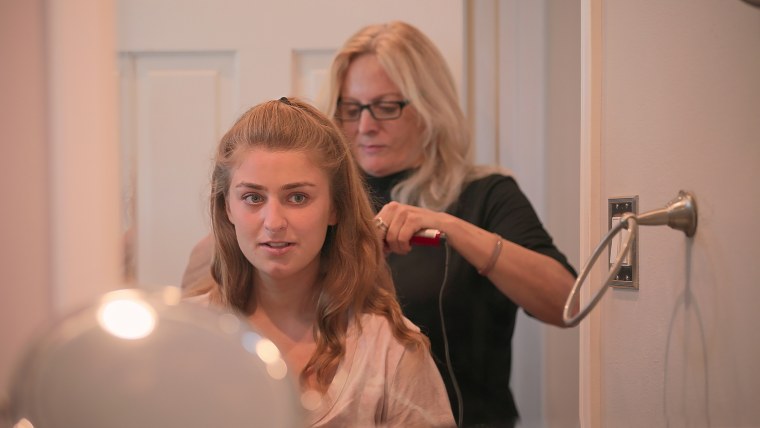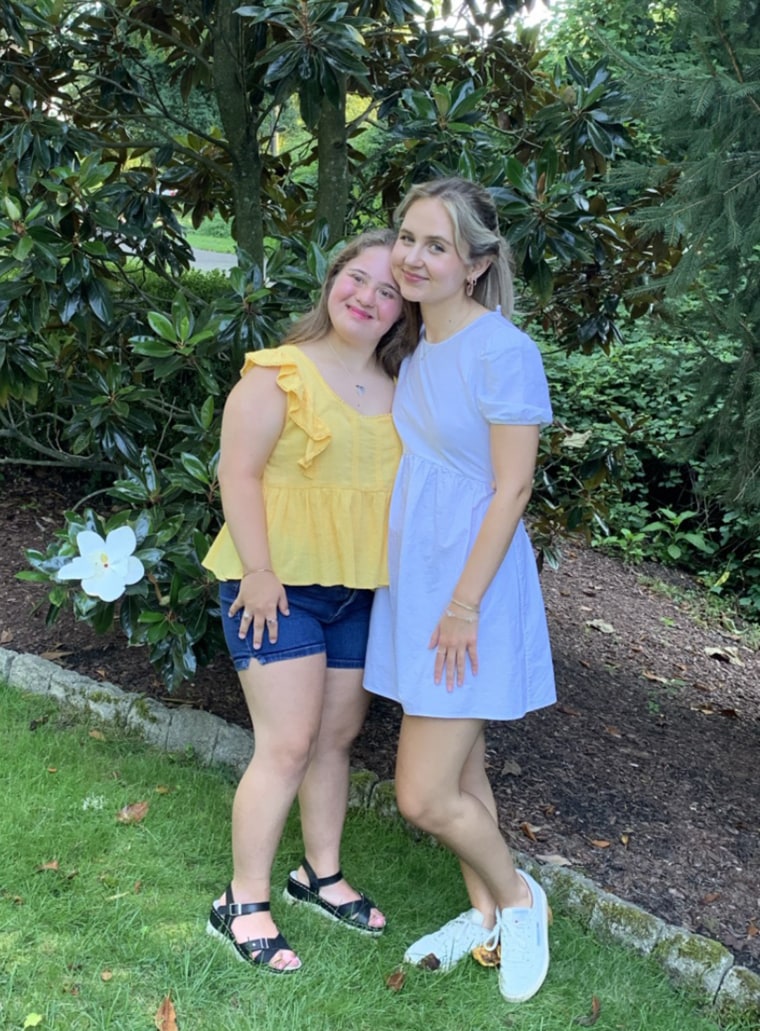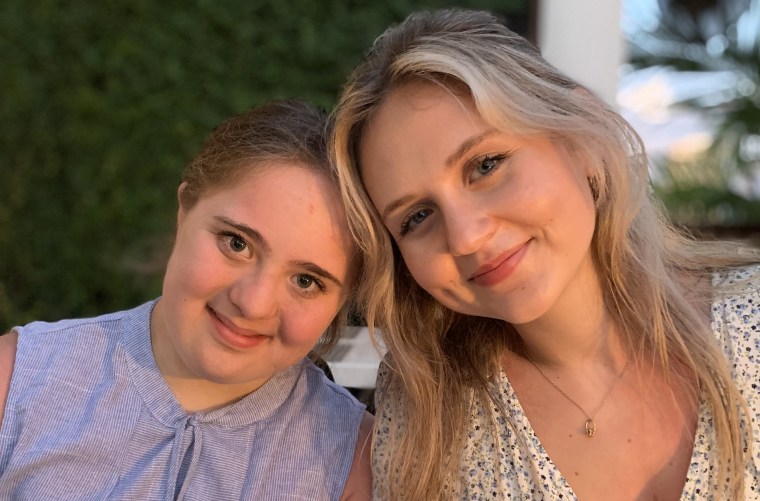Growing up with a younger sister with Down syndrome, I never saw a big push to represent people who look like her in the media.
So when "Love on the Spectrum" came out in 2019, I was beyond thrilled to see a show that was going to shed some light on the community of people with disabilities (mostly autism, specifically) — and what it's like for them to navigate the world of dating.
I watched the first two seasons in awe of the bravery of the participants. I could never have the courage to be so vulnerable on camera about my dating life. But when I think of people in my life who would be so courageous as to put themselves out there like that, I think of someone like my younger sister, Eve.
Eve, who’s 18 years old and about to graduate from high school, loves love. She’s been in a serious relationship before but is now single by choice (although she says she’d like to find a boyfriend when she goes to college next year, and hopefully get married someday).
For context, Eve told me her ideal man loves sports and music just like she does, and is a brunette with blue eyes. Oh, and she wants Mr. Right to have "good posture." A woman who clearly knows what she wants.
Just like the participants on "Love on the Spectrum," Eve has questions and concerns about dating that she needs a little help with. I’m grateful that I get to be one of the lucky people she comes to.
To get a deeper understanding of the show, I sat down to chat with Cian O’Clery, co-producer and director of "Love on the Spectrum." After the success of the first two seasons, which were set in Australia, he told me he decided that they needed to expand to other countries. "We want to continue to shine a light on the diversity of the spectrum ... it's a great opportunity to keep telling stories of people on the spectrum and highlighting that sometimes people do need support when it comes to dating and relationships," he said.
On May 18, “Love on the Spectrum U.S.” premiered with a six-episode season complete with a cast of six participants from the U.S., all looking for love.
When watching the new U.S.-based season, I was curious to see how Eve's experiences with dating compared to those of the participants on the show, especially since the new season took place a little closer to home.
Of course, it’s not totally fair for me to compare Eve’s experiences to those of the people on “Love on the Spectrum” — every person, regardless of ability, has completely unique and varied experiences and struggles. Ultimately though, regardless of Eve’s diagnosis, her goal is the same as the participants in the show — and, just like them, she may need a little extra support from friends and family in achieving that goal.
One of the biggest similarities I noticed between Eve's experience and those I've watched on "Love on the Spectrum" is how families play such a massive role in the support and growth of individuals with disabilities as they search for love. Eve is very outspoken, which helps my parents and me support her in anything she does — including in her dating life.
I also appreciate how well the show highlights equally the strengths and weaknesses of each participant and how the show celebrates all of those qualities. Even though some of the contestants may be a little shy, that doesn't stop them from having the courage to put themselves out there in their most authentic light.
Eve, on the other hand, is very outgoing — in fact, she told me that she thinks her ability to socialize is her biggest strength in dating. As for her self-proclaimed biggest weakness? Texting back. Don't call her OR beep her if you want to reach her — she probably won't answer.
"It's easy for me to talk to boys," Eve told me. "Flirting is easy. I'm a nice person and very fun, and I feel like boys like that about girls."
Since Eve is my only sibling, I've always felt an extremely powerful and innate feeling to protect her. Although Eve doesn't necessarily need guidance or help from me all the time, I really treasure the moments when she comes to me and asks for advice about boys and dating (or anything, really). Eve and I are extremely close, and I'm happy knowing that she trusts me and feels comfortable asking me questions about dating and love.
I saw similar dynamics on "Love on the Spectrum U.S.," specifically with one of the participants, Abbey. While all of the family members and friends of each participant are incredibly supportive of their journeys, I really felt like I could understand Abbey's story the most, as she has an older brother and mom showing her support and giving her advice as she embarks on her journey to fall in love.

Although the show is primarily focused on individuals with autism, one of the participants, Subodh, ends up becoming serious with a girl named Rachel, who has Down syndrome. Seeing people like Rachel on the show find their match gives me hope that Eve will be able to do the same one day — because much like Rachel, Eve is kind, giving and engaging, and is absolutely worthy of that special connection and love, just as anyone else is.
Eve told me that, in her next relationship, she wants someone who will talk to her often and share common interests with her.
"I want someone who listens and pays attention," she said.
Something that I've thought about increasingly as I've gotten older is how isolating it can often feel to have a sibling with a disability. Not because I feel shameful or unappreciative — but because our experience is simply different than the experience someone would have with a sibling who does not have a disability.
In fact, I feel quite the opposite of unappreciative — having Eve in my life has taught me to be patient and empathetic. She's also taught me to not take life so seriously — so, if anything, I am beyond grateful for her and the relationship we share.

When I meet someone or see someone who shares that experience of having a sibling with a disability, like Abbey's brother on "Love on the Spectrum," I feel comforted. I wonder if he feels the way I feel, if he wants so badly to see his sister find true love, like I do.
Because I have that deep sense of compassion for Eve, I can't help but feel that same compassion for the participants on the show, as well as the family members and friends of the participants. When I watch the show, it's hard for me to not get emotional — thinking about the team it sometimes takes to help people like Eve, or Subodh, or Abbey, and then the happiness that comes when you see that help and support come to fruition.
So if you see me watching "Love on the Spectrum" and shedding a few tears ... well, now you know why.
I feel particularly comforted knowing that these contestants have people who are advocating for them in the same way I advocate for Eve.
O'Clery explained that ensuring the participants on the show feel extremely comfortable on set is a priority for the production team. “For us, it’s so important to look after the people in the show and to represent the community really respectfully,” he told me.
I hope that folks who watch "Love on the Spectrum" gain a deeper sense of empathy and understanding for people and learn why it's so crucial to be a respectful advocate for individuals with disabilities, in and out of the dating world.
"Everyone is so different, so you can't make assumptions about someone," O'Clery said. "I think it's important to not define someone from a label, but for who they actually are."
I couldn't agree more.

